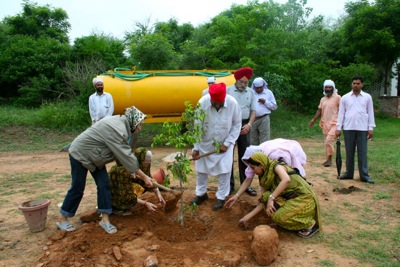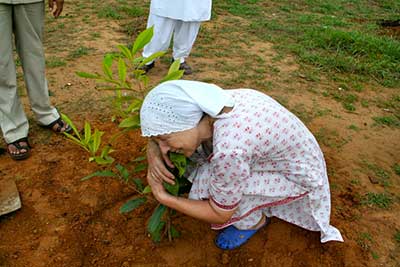Mauli Dharti Mauliya Akash

On August 15th, which is also celebrated as India’s Independence Day, Gobind Sadan sevadars of all types and all ages collected to plant 80 more trees in the hill area between the mosque and Krishna’s temple. With high spirits, children and old people enthusiastically carried taslas of dirt, neem compost, and manure mixture to the holes to help plant the new trees. By Maharaj’s grace, welcome rains began just after the tree planting was finished. Everyone then gathered in the auditorium for a programme about Gobind Sadan’s efforts to build a healthy environment.
The Chief Guest of the occasion was Dr. Priya Ranjan Trivedi, an environmentalist so active and renowned that his biodata runs 7 pages. He has established many institutions in India and other countries and has helped many governments to establish universities, colleges and schools for teaching and research of environmental protection, sustainable development, ecological tourism, peace studies, human rights, disaster mitigation, and rural and urban entrepreneurship. He has also organized international conferences in various countries on environment, alternative and complementary medicine, eco-philosophy, and sustainability. He has written many publications on these subjects. On this occasion, he said, “I have been thinking of coming here for several years. Fifteen years ago I was blessed to come here to meet Baba Virsa Singh Ji with more than 100 delegates from all over the world. I met Babaji and got his blessings. I thought, ‘What a place-so clean and green! I need to get Babaji’s blessings!’ Baba Virsa Singh Ji Maharaj was a great Holiness. We should spread what he left for us as much as we can. And with his blessings may there appear many more of his mini-incarnations.”
 The programme was blessed with touching kirtan by Bibi Jaswant Kaur, Bhagat Ji, and Hirpal Singh, including “That earth has become green and prosperous where my True Guru has come to sit.” Dr. Surjit Kaur Jolly, Secretary of the Gobind Sadan Institute for Advanced Studies in Comparative Religion, introduced the programme by saying, “We can call this day at Gobind Sadan ‘Environment Day’ or ‘Shravan Celebration.’ In this monsoon season, all nature becomes green. Dirt is washed off the plants, new life is born, birds become happy. Humans should also become ‘green’ as new ideas occur to them. The earth on which we are sitting now used to be a hill area on which even grass didn’t grow. Thanks to the hard work of Maharaj ji and his followers, today you see the beauty of trees all around, as if the earth had put on green clothes.”
The programme was blessed with touching kirtan by Bibi Jaswant Kaur, Bhagat Ji, and Hirpal Singh, including “That earth has become green and prosperous where my True Guru has come to sit.” Dr. Surjit Kaur Jolly, Secretary of the Gobind Sadan Institute for Advanced Studies in Comparative Religion, introduced the programme by saying, “We can call this day at Gobind Sadan ‘Environment Day’ or ‘Shravan Celebration.’ In this monsoon season, all nature becomes green. Dirt is washed off the plants, new life is born, birds become happy. Humans should also become ‘green’ as new ideas occur to them. The earth on which we are sitting now used to be a hill area on which even grass didn’t grow. Thanks to the hard work of Maharaj ji and his followers, today you see the beauty of trees all around, as if the earth had put on green clothes.”
Churchill Chadha, speaking on behalf of Baba Virsa Singh Maharaj Memorial Trust, said, “Under the guidance of Maharaj Ji Gobind Sadan has always been doing something good for humanity. Planting trees is as important to us as breathing. God created the world, and then created a human being and told him, ‘I made this all for you. But use only as much as you need. If you use more than you need it will affect your environment.’ But we have cut so many trees that today we have to face problems. We need to plant as many trees as we can so we could cope with the situation of global warming.”
Hardip Singh, who prays every hour around the clock at the havan, said, “Forty years ago this was a mountain area. The land was dry. We started planting trees here according to Maharaj’s hukam, and we should always keep planting them. Today is a very joyous day, Independence Day, and we celebrated it by planting trees.”
Bhai Kirpal Singh, venerable Head Granthi and Head Research Scholar of Gobind Sadan, reiterated, “Look how many trees are here in Gobind Sadan, where even grass didn’t grow. It is only because of Maharaj ji’s ideas, his love for agriculture. It was also the idea ofMaharaj ji to get the literature about the freedom fighters from the National Archives. He spend lakhs of rupees for that project. At Gobind Sadan you can find so many books on the struggle for independence that are available nowhere else.”
Gobind Sadan’s imam, Jabar Ali, said that he could not praise Maharaj Ji enough, for “If I start praising him, the day will become short, the tongue will become small, but the praise will not be over. That is why I will just say, ‘Now when I have become the slave of the river, I don’t need the wealth of the earth.’ We have become the slaves of Babaji, for us there is no better wealth. Let all of us keep this wealth in our hearts and continue fulfilling his mission. This is the house of Babaji, from which even a stranger doesn’t go with empty hands.”
Mary Fisher praised the work of the children in planting trees and in learning about and helping to further Babaji’s mission. She requested various children to sing the songs they had prepared for the occasion, including a group of girls who sang,
 Gobind Sadan
Gobind Sadan